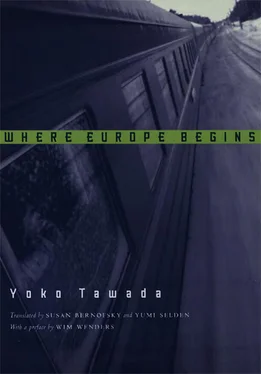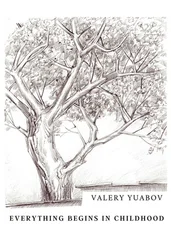Yoko Tawada
Where Europe Begins
Yoko Tawada’s work straddles two continents, two languages and cultures. Born in Tokyo in I960, she moved to Hamburg at the age of 22 and became, simultaneously, a German and a Japanese writer. She has since published a good ten volumes in each language, won numerous literary awards (including Japan's prestigious Akutagawa Prize in 1993 and, in 1996, Germany’s Adelbert von Chamisso Prize, the highest honor bestowed upon a foreign-born author), and established herself, in both countries, as one of the most important writers of her generation.
Tawada’s poetry, fiction, essays and plays return again and again to questions of language and culture, the link between national and personal identity. If the languages we speak help define us, what happens to the identity of persons displaced between cultures? “The interesting,” she once said in an interview, “lies in the in-between.” And so her characters are constantly in motion, journeying between countries, languages and modes of being — providing us with “travel narratives” full of glimpses into the interstices of the world in which the structure of all experience is revealed.
Of the stories contained in this volume, two (“The Bath” and “Spores”) were written in Japanese, and the rest in German. Three of the shorter German pieces (“Storytellers without Souls,” “Canned Foreign” and “The Talisman”) appeared in the collection Talisman , which inspired the essay by Wim Wenders.
Tawada’s most recent books in German are Opium für Ovid (Opium for Ovid and Überseezungen (Foreign Tongues) , and in Japanese, Hinagiku no cha no baai (If It’s Camomile) and Hikari to zerachin no raipuchihhi (The Leipzig of Gelatin and Light) . She was the Max Kade Writer in Residence in the German department at MIT in 1999, has had three plays performed on major stages in Germany and Austria, and has recently gone on a reading/performance tour with jazz pianist Aki Takase.
Preface: On Yoko Tawada’s Talisman
Reading this book,
I kept feeling a tremendous urge to take off my hat
to the author.
As it happens, I wasn’t wearing one
and I wasn’t sitting on a subway, either,
where the book had just taken me, but in an airplane.
Still, I had a desire to at least bow, if only in spirit.
Not the way we bow in Germany, of course,
with just the slightest nod of the head,
but in the Japanese style,
bending from the waist at a ninety-degree angle.
And I would hold this position for some time:
Only the most profound reverence, I felt,
could do justice to this writer and her work.
The book is a travelogue.
It relates the experiences of a traveler,
and as the reader you experience all sorts of things
yourself
and you travel far and wide while reading it.
Where do these travels take you?
Let me start this differently.
I am a great traveler myself,
have done quite a lot of writing in planes, trains
and hotels
and also made a number of films on the road.
I’ve been to Japan so often
that I can rightfully call it “countless times,”
and even recorded one of these visits in a diary film
called Tokyo-Ga .
Nonetheless, I’ve always remained an outsider,
a puzzled, marveling observer,
and, as I’ve come to realize,
the more time I spend in the country,
the less I know about it.
In the end. I’m still a tourist.
At least that’s the impression I have
when I consider the reverse journey
that this Japanese woman
made into my own country, into Germany.
While all I managed to do in Japan
was to learn a handful of signs and phrases,
beyond which the language remained a book with
seven seals for me,
Yoko Tawada has actually mastered the German
language,
has actually studied and worked here,
and has indeed written this complex, subtle,
intelligent and poetic book
in German!
An utterly heroic, even titanic task that she has taken
upon herself,
it appears to me,
the more I immerse myself in it,
though there is nothing laborious about the book
itself,
on the contrary, it flows effortlessly.
At the same time, this is definitely not a “German”
book,
if I may put things in such simplistic terms.
No one else but a Japanese woman could have had
these experiences
and could have written this book,
down to its grammar and its most minute
observations.
Above all, the book deals with these “small” observations,
even if this procedure gradually expands to a much
larger picture:
A voyage of discovery and adventure that transports
the reader
deep into what Yoko Tawada once called the bretselhaft
German soul
(in an untranslatable German adjective of her own
invention
that combines the words “mysterious” and “pretzel”).
Like in a novel by Jules Verne,
fantastic new spaces keep opening up before your
inner eye,
and with conflicting emotions and mixed feelings
I rediscovered in its pages my fatherland and mother
tongue,
torn between tenderness, understanding and
indignation,
smiling and frowning again the next moment.
Having embarked on this adventure,
I learned so much about “us,” about “ourselves,”
that I almost didn’t realize,
when the journey came to an end,
that I suddenly knew far more about Japan
than I ever saw or learned there, “on location.”
And it was here, at this intersection,
that I finally understood
what is so astonishing about this book:
It is not set in Rothenburg-on-the-Tauber,
not in Hamburg or Tokyo.
It is not a book about “Europe” versus “Asia” or the
other way around.
Rather, it is a book that comes to us from a
no man’s-land
where words, names, signs have no meaning any more,
a place where everything is put in question,
and where the only actions that count
are perceiving, taking in, feeling
and relating the experience of it all.
Thus, this slim volume suddenly becomes a model,
a model of utopian storytelling, of utopian traveling.
And so, as in my mind
there cannot possibly be a more beautiful book,
and I can’t come up with more flattering
compliments,
I am holding my imaginary hat far in front of me.
almost touching the floor,
and I am looking forward,
at the end of this flight from Berlin to Los Angeles,
to all the things that I will be able to see differently,
in Japan as well as in Germany.
Thanks to this book by Yoko Tawada.
WIM WENDERS
1
Eighty percent of the human body is made of water, so it isn’t surprising that one sees a different face in the mirror each morning. The skin of the forehead and cheeks changes shape from moment to moment like the mud of a swamp, shifting with the movements of the water below and the footsteps of the people walking above it.
I had hung a framed photograph of myself beside the mirror. The first thing I would do when I got up was to compare my reflection with the photograph, checking for discrepancies which I then corrected with makeup.
Compared to the fresh complexion shown in the photograph, the face in the mirror looked bloodless and pale, like the face of a dead person. Perhaps this is why the rectangular frame of the mirror reminded me of a coffin. When I held up the candle to look more closely, I saw that my skin was covered with fine, overlapping scales, smaller than the wings of tiny insects. Carefully I inserted one long thumbnail beneath a scale and flicked it off. In this way I was able to strip off the scales one at a time. When I unbuttoned my pajama top, I saw the scales covered not only my face but my chest and arms as well. If I began removing them one by one, I would be late for work. I decided to take a bath to soften the scales and then rub them off.
Читать дальше












